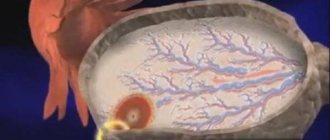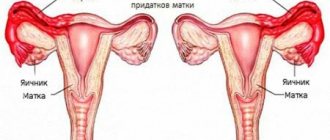When your period is late, your stomach feels tight—many women have experienced these symptoms more than once. In this case, sharp pain may occur, radiating either to the left or to the right side. This undoubtedly makes the woman anxious. Not only did her period not begin on time, but she also felt constant discomfort in the abdominal area (aching, tingling or minor pain). However, there are logical explanations for all this, and once understood, a woman will be able to understand why she feels pain in the lower abdomen, how to deal with it, and whether it is dangerous for the female body as a whole.
First of all, it is necessary to understand for what specific reason a woman feels pain in the abdominal area during a delay in the onset of menstruation or during the menstrual cycle. It is quite easy to distinguish such pain from other possible types of pain. Its presence is quite logically explained by the fact that it is precisely in the lower abdomen that the uterus is located, which, through its contraction, gets rid of the sloughing endometrial layer.
Each representative of the fair sex has her own individual threshold of sensitivity. That is why in each woman the pain in the lower abdomen can have its own intensity. For some young ladies, life practically does not change at all during such pain. Other girls, on the contrary, cannot cope with the pain, which is why they often experience dizziness, nausea, and in some particularly severe cases, when the pain is simply impossible to tolerate, loss of consciousness may occur.
Heaviness in the lower abdomen during delay has several possible explanations.
Delay in gynecological diseases
If before menstruation a woman suffers from pain in the lower abdomen, not as usual, there is a disease. The lower back then suffers from inflammation of neighboring organs and circulatory problems. Often, after a delay, a woman experiences uterine bleeding. Possible causes of the pathology are:
- venereal diseases;
- candidiasis;
- thrush;
- uterine fibroids;
- cervical erosion;
- cyst;
- oncological tumor;
- endometriosis;
- endometritis.
The doctor diagnoses some diseases when examining a woman. However, there are those that occur hidden, the woman will have to take tests and undergo an examination. In the absence of gynecological pathologies, the woman’s hormonal background and the functioning of the ovaries are studied, and an ultrasound is prescribed.
The absence of critical days for 2 weeks is not considered a special pathology in medicine. This often happens due to the influence of banal factors - poor environment, nerves, poor quality nutrition, unbalanced diet, sleep disturbances, heavy physical activity and much more. Painful sensations in the abdomen appear on the eve of menstruation and are a sure sign of its imminent onset. Often the stomach hurts for reasons not related to gynecology. It is very difficult to determine on your own why the delay occurred. You should go to your doctor for advice. This way you can quickly guess the reasons for the absence of critical days and quickly solve the problem.
WHAT TO DO IF YOU HAVE A FIBROID, CYST, INFERTILITY OR OTHER DISEASE?
- You are experiencing sudden abdominal pain.
- And I’m already quite tired of long, chaotic and painful periods.
- You do not have enough endometrium to become pregnant.
- Discharge that is brown, green or yellow.
- And for some reason the recommended medications are not effective in your case.
- In addition, constant weakness and ailments have already become a firm part of your life.
Nagging pain in the absence of menstruation: possible causes
Almost all causes of pain in the lower abdomen are pathological in nature, so you should not delay a visit to the clinic. For an accurate and correct diagnosis, a woman needs to undergo tests and undergo an examination, which includes a number of procedures performed only in a hospital setting.
Ectopic pregnancy
This is one of the most common reasons causing the absence of menstruation on time. In most cases, a pregnancy test will show a positive result, even if the fertilized egg is stuck in the fallopian tubes, but sometimes this diagnostic method turns out to be inaccurate, and only one strip appears on the surface of the test zone.
Types of ectopic pregnancy
An ectopic pregnancy is a dangerous phenomenon that can lead to rupture of the fallopian tubes at any stage and severe internal bleeding. To prevent the consequences of the pathology from leading to death, it is important to know the warning signs and symptoms. These include:
- pulling or stabbing pain in the lower abdomen and lower back;
- temperature increase;
- nausea, possible single vomiting;
- lack of appetite;
- cold sweat.
All these symptoms require immediate medical attention. Any delay can cause a pipe rupture and the death of a woman (if she is not provided with the necessary assistance in time).
Endometrial pathologies
Endometritis - inflammation of the uterine mucosa - often causes absence of menstruation, which is replaced by prolonged and heavy bleeding. The same clinical picture is characteristic of endometrial hyperplasia, a pathology that leads to excessive growth of epithelial tissue and thickening of the endometrium. Both pathologies are caused by hormonal disorders, so treatment consists of taking oral contraceptives (Yarina, Zhanin, Diane-35) and normalizing nutrition, which helps maintain the synthesis of female sex hormones. Bleeding is stopped using diagnostic curettage.
Hyperplasia and normal endometrium
The woman will also need special nutrition with a high iron content, which is actively lost during prolonged bleeding. To prevent anemia, you need to eat more veal, legumes, buckwheat dishes, and apples. Pomegranate and apple juice, as well as rosehip decoction, are useful.
Important! Using hematogen as a source of iron is only permissible if you are of normal weight. This product is contraindicated for women with carbohydrate metabolism disorders and excess body weight.
Sexual infections
The most common female problem is thrush. This disease is caused by yeast fungi of the genus Candida, so the medical name for thrush is candidiasis. The growth of pathogenic flora is facilitated by changes in the acidity of the vaginal environment and the death of lactic acid bacteria, which maintain an optimal balance of microorganisms on the surface of the mucous membranes of the genital organs. A common cause of this disease is poor hygiene and the use of care products that are not suitable for intimate hygiene. Frequent washing and douching also dry out the vaginal mucosa, creating favorable conditions for the growth of fungus.
Any sexually transmitted infections (gonorrhea, chlamydia, trichomoniasis) are accompanied by additional symptoms, so it is quite easy to suspect their presence.
Symptoms of gonorrhea in women
Symptoms of sexually transmitted infections
| Sign | Consistency of discharge | Discharge color | Smell | Painful sensations |
| Candidiasis | Curdled, possible inclusions and lumps | White, cream | May be absent, but more often there is a sharp sour milk smell (reminiscent of spoiled kefir) | Burning and itching in the perineum, vagina or anus, nagging pain in the lower abdomen |
| Gonorrhea, chlamydia, trichomoniasis | Thick | Green, yellow, brown | Putrid, “fishy”, pronounced | Cravings when emptying the bladder, pulling sensations in the lumbar region |
| Viral infections | Sticky, slimy | Transparent | Rotten egg smell | Mild itching may occur |
Sexual infections must be treated immediately. If the disease becomes chronic, complications cannot be avoided.
Inflammation of the appendages
Inflammation of the appendages in women
At the initial stage, inflammatory processes in the fallopian tubes and appendages (adnexitis) are accompanied by slight nagging pain in the lateral part of the lower abdomen. As the pathology progresses, the intensity of the pain increases and it becomes acute and stabbing in nature. It is difficult to stop such sensations on your own, since this requires eliminating the cause, that is, getting rid of inflammation.
The delay with adnexitis can range from 3 to 7 days. By the end of this period, the pain becomes almost unbearable and reduces motor activity, so the woman requires qualified assistance in a gynecological hospital.
Important! Incorrect or insufficient treatment of adnexitis in 50% of cases ends in infertility and disturbances in the functioning of the reproductive organs.
Delayed menstruation with a negative test: reasons
If we talk about the reasons that provoke a delay in menstruation during the “-” test, they can be divided into two large groups:
- Are common.
- Medical.
Common reasons include the following:
- Pregnancy is the first thing that comes to mind when your period is late. But the strip test quite often shows a negative result with such a delay. One strip may be present during pregnancy if the test is done earlier than 5 days from the start of the delay (provided the woman has a stable cycle).
- Anovulatory period. According to the physiology of a woman’s body, ovulation occurs in 10 cases out of 12 menstrual cycles. As they say, 2 cycles are “idle”. Gynecologists say that with age there are more “single men”, which can provoke an unstable “arrival” of menstruation. But the test shows one line, since there is no pregnancy.
- Stress. Quite often, stressful situations provoke the production of progesterone (the pregnancy hormone), which helps delay the start of menstruation. Of course, a small scandal at home or a misunderstanding at work does not have such a reaction, but the death of a loved one or a significant loss of property may well cause the absence of menstruation for 1-2 cycles, and there will be no fact of pregnancy.
- Lots of regular physical activity. We will not go into detail about how this affects our internal organs. Let’s just note that 80% of women who professionally engage in weightlifting do not have periods for six months or a year. Therefore, if this is not your career and you do not plan to become a world champion, do everything in moderation and do not overwork your body.
- Obesity (excess weight). In most cases, in advanced stages of obesity (grade 3–4), the body’s reproductive and endocrine systems are disrupted, which provokes unripeness of the egg or its unstable maturation. Therefore, it is appropriate to talk here not about a delay in menstruation, but about a disruption of the menstrual cycle that needs to be adjusted. Of course, in these cases the test will be negative, because there is no point in talking about pregnancy, since it is quite difficult to get pregnant with obesity in the final stages.
- Anorexic condition. The problem is similar to obesity, only exactly the opposite. The egg does not have the strength to mature, and this is what causes the absence of menstruation. This is also the reason for the inability to conceive a child.
- Climate change. Many women have probably noticed that after going on vacation to other climatic conditions, the cycle shifts by 5-8 days. This is normal as the body is undergoing acclimatization. The test in such cases is “single-lane”, although there is a delay.
- Taking hormonal drugs. Taking medications containing hormones affects the functioning of sex hormones, which are responsible for the stability and course of the cycle. As a side effect of such medications, there may be a delay in menstruation. The test will give a negative result indicating pregnancy.
As for the medical factors for the absence of menstruation on time with a negative test, these could be:
- Ovarian dysfunction (polycystic disease).
- Biological changes (restructuring before the onset of menopause).
- Diseases of the uterus.
To avoid severe pathologies of the uterus, such as adenomyosis, fibroids, endometriosis, leading to cycle disruptions and infertility, it is necessary to treat the first manifestations of any pathologies of this organ. You can learn about cervical erosion and methods of its treatment in the article: “Cervical erosion: symptoms, treatment, folk remedies for combating cervical erosion.”
Why is there a delay in menstruation?
Very often, a woman is faced with the fact that she has a delay in her period and has a tummy tug for several days.
Symptoms such as these may indicate pregnancy. In this case, a dangerous sign is called nagging pain.
https://youtube.com/watch?v=irjZ0-So-cA
It is worth paying attention to how often and severely the pain manifests itself and how many days there are no periods. An experienced specialist must promptly distinguish pregnancy from a woman’s life-threatening pathology
An experienced specialist must promptly distinguish pregnancy from a woman’s life-threatening pathology.
Doctors identify the main factors that provoke the appearance of delay. They are:
- The beginning of the monthly cycle in young girls.
- Pregnancy and lactation.
- Climax.
- Problems with the functioning of the nervous system.
- Hormonal changes.
- Frequent stress, severe emotional stress.
- Working in hazardous production and poor environmental conditions.
- The woman is overweight.
- Anorexia.
- Abuse of alcohol or smoking throughout the day.
- Previous surgery.
- History of acute or chronic pathologies.
- Neoplasms on the genitals.
- Inflammatory process in the uterus or appendages.
- An infection occurring in the genitourinary system.
We can talk about a physiological process when the delay manifests itself in girls during menarche, and in women of advanced age during menopause.
Signs of menopause appear gradually: some time before the complete disappearance of menstruation, a woman notices an irregular cycle and a pulling sensation in the abdominal area throughout the day.
The most important thing here is to remember that even with a decrease in the ability to conceive, pregnancy can occur. Therefore, if there is a delay, you should immediately take a pregnancy test.
Girls who are familiar with the phenomenon of dysmenorrhea (pain during menstruation) know firsthand that the sensations can be completely different - it can be either moderate pain with general malaise, or a fairly serious deterioration in condition, accompanied by various symptoms, such as fever , nausea, vomiting.
Sometimes the whole body can hurt, and sometimes there is no pain at all. The reasons for the appearance of these sensations may be different:
- Hormonal problems, when the lower abdomen pulls due to frequent contractions of the uterine walls due to an excess of the hormone prostaglandin in the body.
- Stress before the start of the cycle, other emotional stress.
- Lack of minerals, in particular magnesium.
- Various pathologies.
The impact of external irritants on the state of the reproductive system forces women to visit a gynecologist more often, but a visit to a doctor is not always timely, since an inconvenient work schedule, household chores and other responsibilities sometimes force us to put health care far from the forefront.
This reason can also cause a long delay. This is a disruption in the passage of menstrual days.
It is observed in teenage girls 12-15 years old. Most often this happens in winter or spring.
Juvenile uterine bleeding is associated with a lack of vitamins in the diet, changes in hormonal levels, and stress, which are the main cause. The body is just beginning to learn to exist harmoniously, produce an egg, build up hormones, etc. In this case, the girl may feel pain in the lower abdomen and general malaise.
Causes of abdominal pain and delayed menstruation
The timely onset of menstruation is a sign of the health of the female genital organs. On average, a woman's cycle lasts 28 days, but a duration of 26-35 days is also considered normal.
Delayed periods and pain in the lower abdomen often indicate pregnancy, but many pathologies are hidden under these seemingly insignificant signs.
It is recommended to take a home pregnancy test, but regardless of the result, if your period has not started within a week, you should consult a doctor to find out the cause of the pain in the lower abdomen.
If you are pregnant, it is recommended that you take a pregnancy test first.
Why does your stomach hurt?
The first cause of discomfort is pregnancy. Pain is normal at the beginning of fetal development. This is due to the production of hormones and changes in the size of the uterus. If conception is excluded, then the listed factors should be in the woman’s field of vision in order to determine the cause in time and take action.
- Hormonal imbalance. It occurs against the background of uncontrolled use of hormone-containing drugs, as a result of poor functioning of the thyroid gland and pancreas, as well as severe weight loss and inflammation of the ovaries.
- Formation of tumors or cysts in the uterus and/or ovaries.
- Endometriosis (growth of the inner walls of the uterus).
- Restructuring of the body associated with menopause.
- Inflammation of any localization.
- Strict diet, fasting.
- Climate change.
- Nervous shock, prolonged stress, depression.
- Long-term use of medications. Intoxication of the body occurs. As a result, almost all body systems fail.
Stress and nervous tension can cause delays
As a rule, with the listed signs, the stomach hurts and a delay in menstruation lasts up to 10 days.
All this time, the woman feels like during PMS: she periodically has a headache, craves sweets, her mood changes sharply, and her breasts swell.
Every woman should periodically drink chamomile or linden tea.
Linden contains flavonoids, which prevent hormonal imbalance, and chamomile contains antibacterial substances that suppress the growth of infections.
You should listen carefully to your condition to see if the pain is increasing. It is possible that the woman has intestinal or renal colic or chronically inflamed appendicitis, or acute appendicitis, which requires immediate hospitalization. You cannot relieve pain with antispasmodics or painkillers until you find out exactly where it is located and what caused it.
How to distinguish pregnancy (including ectopic)
Any woman who has regular sex life, with nagging pain in the lower abdomen and delay, thinks about pregnancy. The easiest and fastest way to determine is test strips.
But these remedies may show an incorrect result and, if the pregnancy is very short, the test will not show it. For this reason, it is recommended to be examined by a gynecologist and undergo some tests.
As a rule, most women at the beginning of pregnancy experience chest pain, irresistible cravings for certain foods, morning sickness, weakness, drowsiness and heightened perception of smells.
With an ectopic pregnancy, the stomach can hurt very much
If a woman has previously had a sexually transmitted infection and was treated for inflammation of the reproductive system, then she runs the risk of having an ectopic pregnancy. It is almost impossible to identify the pathology on your own, so an examination by a doctor is required.
Signs of a normal pregnancy will also accompany an ectopic pregnancy. However, the level of hCG hormone in the blood below normal is a direct sign that the fertilized egg is developing outside the uterus. Normally, the hCG level doubles every second day.
With an ectopic pregnancy there is no such surge.
What abnormalities in the reproductive organs should be excluded?
When a woman’s period is late and her stomach hurts, and the test results are negative, there is reason to think that some kind of infection has entered, inflammation has begun, or tumors have grown.
What diseases are most common and their characteristic signs are described in the table.
DiseaseSymptoms
| Vaginitis | A disease of the vagina, which is accompanied by inflammation of its walls. It is characterized by pain in the lower abdomen, in the lower back, and sometimes spotting. As a rule, there is a delay, and the stomach hurts, as during menstruation, but there are no other signs of menstruation. |
| Adnexit | Inflammation localized in the fallopian tubes and appendages, accompanied by severe nagging pain. Lack of treatment can lead to infertility. Often the woman has a fever, the cycle is disrupted, and the pain syndrome lasts constantly. |
| Spikes | The result of long-term chronic inflammation. Formed adhesions are the cause of infertility. Accompanied by delay, pain in the lower abdomen. |
| Venereal diseases | In addition to pain, a woman is bothered by opaque discharge with an unpleasant odor, and sometimes itching. |
| Varicose veins | Varicose veins located in the pelvis are a chronic incurable disease that is dangerous due to bleeding. The disease does not make itself felt for many years. The main symptom is absence of menstruation for up to 7 days, pain in the abdomen and perineum, pain during sex. |
| Polycystic | This ovarian pathology is accompanied by the formation of cysts, which lead to cycle instability, hormone imbalance, aching abdominal pain, and increased secretion of the sebaceous glands of the head. With polycystic disease, it is painful to sleep on your stomach, and your period is delayed for more than a week. |
What other diseases can cause problems?
If your stomach hurts when your period is late, the best thing to do is consult a doctor. Poor functioning of the gastrointestinal tract, dysbiosis, gastritis with low acidity lead to vaginal dysbiosis, which will result in heaviness in the abdomen, pain, and vaginal discharge (cheesy).
If the pain is very severe, do not delay, consult a doctor
If a woman has a delay and her stomach swells after any meal, it is necessary to take a course of probiotics to increase the number of beneficial bacteria. But it is still better to be examined by a gastroenterologist. It is often found that abdominal pain is caused by poor nutrition, being on a strict diet, or on a mono-diet.
The development of fibroids can also cause intense pain in the central part of the abdomen. As the formation grows, the pain becomes stronger.
When an ovarian cyst forms, the stomach hurts like an abscess. Pain syndrome disturbs during sudden movements, jumping, running, standing up suddenly, dancing. In diseases of the bladder and kidneys, additional symptoms include nausea and fever, pain when urinating, and frequent urge to go to the toilet. Watery vaginal discharge may occur.
The delay can last up to six months. In this case, the doctor diagnoses “amenorrhea”, i.e. absence of menstruation. As a rule, treatment is based on taking hormonal drugs. Intense physical activity puts the body into a state of stress, which also affects hormonal levels and the regularity of menstruation.
If you are experiencing stress, you should visit a neurologist
Severe overexertion, stress, depression are factors that can cause a delay in menstruation and a feeling that the lower abdomen is aching. With this problem, you should contact a neurologist or psychologist.
You should definitely take B vitamins, stay at rest, you may need a vacation and limit communication. Solving mental problems contributes to the resumption of the cycle. The psychological reason for the delay is a long absence of contact with a man. For some women, menstruation stops for several months.
The resumption of the cycle is facilitated by the return of intimate relationships to a woman’s life.
If a woman has changed her country of residence or visited a place with a different climate, then she will probably experience a slight increase in her cycle. Some people experience problems with a sudden change in weather, with a tightening of the lower abdomen even before the delay.
What examinations need to be completed
To find out what is causing the delay, you will need to go to the hospital to get tested:
- taking smears – necessary to determine the microflora of the vagina, shows the presence/absence of infections and fungi;
- ultrasound examination of the pelvic organs - allows you to determine the size of organs, track changes in tissues, the presence and size of tumors;
- STI detection test;
- a blood test that determines the level of certain hormones. It will help identify or exclude thyroid dysfunction.
To clarify the diagnosis, you need to donate blood for analysis.
If the gynecologist suspects violations related to the specialization of other doctors, then, if necessary, the following are prescribed:
- mammography;
- Ultrasound of the thyroid gland / adrenal glands / pituitary gland;
- conclusion of a gastroenterologist / urologist / endocrinologist;
- magnetic resonance imaging of the brain;
- histology.
Based on the examination results, the specialist will make a diagnosis and prescribe adequate therapy. The duration of treatment is individual and depends on the severity and stage of the disease.
When you need to see a doctor urgently
It is recommended that women listen very carefully to their condition when there is a long delay, but the lower abdomen hurts, and the test shows a positive result.
Cramping pain is a sign of miscarriage. In this case, you need to call an ambulance or go to an urgent appointment with a gynecologist yourself. There are many reasons for miscarriage.
Common - infections, hormonal disorders, congenital pathologies of the uterus.
Why the lower abdomen hurts when menstruation is delayed, this video will tell you about it:
In case of cutting or stabbing pain, accompanied by nausea, vomiting, and diarrhea, you should immediately call an ambulance, as these are signs of appendicitis.
Source: https://mesyachnie.com/boli/niz-zhivota-pri-zaderzhke.html
Disruption in a woman's menstrual cycle
In some cases, a delay in menstruation does not pose any danger to a woman. Of course, if it lasts no more than a week, and there is no severe pain in the lower abdomen or strange discharge. Today, many representatives of the fair sex experience such disruptions in their cycle from time to time.
It should be noted that changeable mood and slight nagging pain in the lower abdomen are normal premenstrual syndrome during a delay. Let's look at why such failures occur.
- Because of stress. For our body, any strong emotions (joy, anger, depression) can trigger hormonal changes. As a result, the date of your period shifts. If a woman experiences prolonged stress and strong feelings, then the symptoms of this condition are very similar to pregnancy, namely nausea, dizziness, weakness, etc. The only advice in this situation can only be calm. By any means you need to try to bring yourself to a normal state and then the cycle will improve.
- Climate changes. The female body is very sensitive to sudden changes in weather, changes in climate zones, changes in pressure or humidity. All of these can cause late or premature periods. Therefore, when traveling, you should be prepared so that the body is not taken by surprise.
- Strong physical stress on the body can provoke a change in the cycle. This is often observed among athletes before competitions or during intense training, as well as among lovers of active sports and pastimes. In this case, there may be signs of premenstrual syndrome a day or two in advance. However, menstruation does not come at the appointed time.
- Cycle disruption can also occur due to strong intellectual stress, because this is also a type of stress. Very often this happens to students during sessions, women during “blockages” at work. Such overvoltage has a negative effect on the body.
In case of such failures, virtually no treatment is required. You just need to restore your peace of mind, establish a daily routine, and everything will return to normal. Even if your test is negative, but there is still no menstruation, there are no signs of “problems” in the body, or discharge, then there is no need to worry. You should only go to a gynecologist when the delay is already more than a week.
On what day of delay should the test be done?
Most often, a delay in menstruation, if it occurs for the first time, means pregnancy, especially if a woman experiences nagging pain in the lower abdomen. A special test for home diagnostics can be done on the first day of the delay, since most of them are highly sensitive to hCG contained in the urine. But in some cases, the test may show a false result at short gestational ages, so to get a more accurate result it should be done after 3-5 days.
To get the correct result from the first day of absence of menstruation using home test strips, you must follow these recommendations:
- The test must be done in the morning immediately after waking up, since at this time the concentration of hCG reaches its maximum value;
- the container in which urine is collected must be sterile;
- Before the procedure, you must wash yourself thoroughly using gentle, fragrance-free products;
- to evaluate the result, the strip must be held horizontally with the test zone facing upward;
- the used strip should not be placed near sources of high temperatures, as this may distort the result;
- The maximum time to evaluate the result is 10 minutes.
How to take a pregnancy test
On the tenth day after the absence of menstruation, any test will show a reliable result, but to be on the safe side, it is better to contact an antenatal clinic.
Features of the female body
The reasons for the absence of menstruation and pain in the lower abdomen described above can be supplemented with some more:
- Long course of antibiotics.
- Hysteroscopy, colonoscopy or treatment of cervical erosion.
- Curettage or complications after termination of pregnancy (both natural and forced).
- Accustoming the body to a new oral contraceptive or its cancellation.
- Taking emergency contraception.
- Menopause (women 45 or 50 years of age with infrequent and scanty periods and a low chance of becoming pregnant).
Any chronic diseases can provoke an incorrect course of the menstrual cycle. Therefore, its absence is a signal from the body about any changes. It is better not to ignore them, but to immediately conduct an examination to rule out anything serious and receive proper treatment.
The female body, as a rule, works harmoniously. But the absence or irregular nature of the cycle, coupled with pain in the lower abdominal cavity and lower back, are signs of an imbalance in the endocrine system. Increased contraction of the uterus itself is a sign of this process.
A woman must be able to listen and understand what her body is telling her. Timely examination and diagnosis will allow you to maintain health and eliminate any pathology without consequences.
The absence of menstrual flow is the result of various phenomena in the female body. It cannot be said that this is always dangerous to health. Sometimes this is the norm. However, seeing a doctor is the right solution to the problem and peace of mind for the woman herself.
A delay in menstruation is considered an invariable sign of pregnancy, as well as the fact that the lower abdomen is pulled at the same time, but sometimes a test carried out in such a situation turns out to be negative. This situation can be considered a serious reason, which requires immediate contact with a doctor. In this case, one should also take into account the presence of such signs as the appearance of nausea and pain, because in fact they can indicate a developing pathological process.
Diseases associated with the gastrointestinal tract
A delay in menstruation can also occur due to certain disorders in the peritoneal area. They may be as follows:
- hernias or adhesions in the intestines;
- inflammatory processes in the intestines;
- intestinal oncology, as a consequence the appearance of tumors;
- inflammation of appendicitis.
If the disease is associated with the gastrointestinal tract, then in addition to the absence of four to five days of menstruation, other symptoms will appear:
- sharp, cutting pain in the lower back and abdomen;
- nauseated, possible vomiting;
- there is often constipation or diarrhea, there may be bloating;
- elevated temperature.
As you can see, a delay in menstruation, a negative test (pulling the lower abdomen and lower back) can be due to completely different diseases. Some pose no threat, others are extremely dangerous, but in any case, the body signals a failure and needs help. Be sure to consult a doctor so that you can start treatment on time and not start the disease, because there may be complications accompanied by unpleasant consequences.
Source of the article: https://magia-krasoty.com/chto-delat-esli-zaderzhka-mesyachnyh-test-otritsatelnyj-tyanet-niz-zhivota-i-poyasnitsu/
If the result is negative
Pain in the actual area with a negative test result often indicates the presence of:
- inflammatory process in the ovaries;
- reproductive anomalies;
- polycystic disease;
- dysfunction of the thyroid gland;
- benign neoplasm;
- malignant neoplasm.
This symptom may indicate improper functioning of the adrenal glands. This often leads to ovarian dysfunction.
Often, the “lateness” of menstruation has nothing to do with the female reproductive organs. This condition can be caused by mental or physical stress. This symptom is often observed during severe stress. Pain in the back and lower back due to the delay of “critical days” can be explained by a sharp change in climate. Young ladies who play sports professionally also suffer from this symptom.
Development of gynecological abnormalities
If, against the background of a delay in menstruation, the lower back is strongly pulled, this may indicate the development of:
- endometritis;
- oophoritis;
- apoplexy;
- vaginitis;
- salpingo-oophoritis.
In this case, a woman may complain that she has a strong pull in her lower abdomen. Menstruation may be “late” by 4-5 days. Often specific discharge appears, accompanied by severe itching in the labia area. During sex, as well as during the evacuation of urine, painful or unpleasant sensations occur.
The main factor that provokes the development of reproductive anomalies in women is the inflammatory process. It is often caused by hypothermia. Another provoking factor is often a sexually transmitted infection.
With vaginitis, inflammation of the vaginal walls is observed. The pain syndrome is intense. The lower abdomen and lumbar region hurt greatly. Sometimes there is moderate itching.
Adnexitis is characterized by inflammation in the uterine tubes and ovaries. The pain is of a mild, nagging nature. This pathology has no specific symptoms. For this reason, it is difficult to diagnose and treat. The danger is that adnexitis can develop into a chronic form, and there is no menstruation. This leads to infertility.
Endometritis is characterized by damage to the uterine mucosa. This abnormal process is characterized by the fact that it may cause pain in the lower back or lower abdomen. Sometimes bleeding occurs.
The cause of lower back pain due to late menstrual flow can also be a venereal anomaly. Often this symptom is observed against the background of ureaplasmosis, candidiasis, chlamydia and mycoplasmosis.
Pathologies of the genitourinary system
When the delay is observed for 1.5-2 weeks and the pain in the abdomen radiates to the lower back, we can talk about the development of cystitis, pyelonephritis and other anomalies of the genitourinary system. Sometimes during the inflammatory process, the absence of “critical days” is observed within 3-4 days.
The main symptom of inflammation is an increase in body temperature. Another specific sign is the appearance of abdominal discomfort. Itching is often present in the labia area. Sometimes the itching is combined with a strong burning sensation.
Gastrointestinal anomalies
Failure of the menstrual cycle may be due to the development of diseases of the gastrointestinal tract. Very often, lower back pain due to “late” menstruation is explained by inflammation of the intestinal walls.
Another cause may be inflammation of the appendix. At the same time, the woman has a strong pull in the lower abdomen on the right. Some women try to numb the pain with analgesics. You should not do this, as the consequences can be unpredictable.
The most terrible reason for the delay of “critical days”, which is accompanied by the appearance of pain in the lower back, is the growth of a malignant tumor. Symptoms depend on which organ is affected.
Often, a delay in menstruation due to disruption of the gastrointestinal tract is accompanied by severe nausea, which often transforms into vomiting. A woman may experience stool upset.
Headache and nausea with delayed menstruation
Headache and missed periods are common. These symptoms may have one common cause or be signs of completely different, unrelated conditions. In any case, these symptoms often indicate the presence of pathologies in the body, so you should not let the problem take its course.
If a headache occurs, combined with a delay in menstruation, a woman needs to visit a gynecologist, therapist and neurologist. Only a comprehensive medical examination will make it possible to understand the causes of the problem and then effectively eliminate it and avoid serious consequences.
- 1 Reasons 1.1 Pregnancy
- 1.2 Others
Causes
A delay of 5-7 days in menstruation is considered absolutely normal. However, many women do not know about this, which becomes a cause of anxiety and excessive suspiciousness. In this situation, many of them begin to listen too closely to their body. The combination of a missed period and a headache can be particularly worrisome.
If a woman has a headache, a delay in menstruation may be due to the following:
- Hormonal surges. In the second phase of the cycle, the amount of estrogen decreases and progesterone increases. This is one of the main conditions for a successful pregnancy if it occurs. If fertilization does not occur, progesterone levels also decrease. Such hormonal changes can cause headaches in particularly sensitive women.
- Changes in water-salt balance. If fertilization does not occur, the amount of progesterone begins to decrease, and estrogen begins to increase. A large amount of estrogen often causes edema. Moreover, edema can affect the tissues of not only the limbs, but also the brain. With swelling of the area located near the hypothalamus, a woman may feel throbbing and pressing pain in the back of the head.
- Migraine. Sometimes women suffer from frequent migraine attacks in the second half of the cycle. Unlike a regular headache, a migraine attack lasts 4 days or more. The pain is throbbing, one-sided, and of high intensity. In severe cases, it is accompanied by nausea (may result in vomiting) and loss of appetite. In this case, intolerance to bright light and strong odors is noted. It is impossible to cope with migraine on your own, since conventional painkillers are powerless in its treatment. Often women have to wait the allotted time for a migraine. Only after this do they feel relief.
- Irritability due to hormonal fluctuations. Excessive irritability and aggressiveness in the second half of the cycle can cause overstrain of the neck muscles. In turn, this provokes pinching of blood vessels in this area and, as a result, poor blood circulation in the brain. Among other things, nervousness can cause high blood pressure. This also leads to headaches.
In all the above cases, the headache will disappear as soon as your period arrives.
Pregnancy
If a woman has a headache and nausea, the reasons for a monthly delay may be pregnancy. After conception occurs, the woman’s body begins to work differently. These changes affect absolutely all organs and systems, but the nervous system reacts most acutely to this process.
Headaches during pregnancy may be constant or may come and go periodically. Painkillers do not help in this case.
For some women, the discomfort subsides several hours after its onset. Relief of the condition can also be observed after sleep.
However, if a woman has early toxicosis, then even after an overnight rest the pain will not completely disappear.
It is worth noting that pregnancy, in addition to late periods and headaches, is accompanied by a number of symptoms.
Among the main ones are the following:
- copious and thick vaginal discharge (it may contain a small amount of blood);
- pain in the lower part of the peritoneum, in the lower back;
- slight increase in body temperature;
- dizziness;
- disruption of the digestive system;
- change in body weight;
- engorgement of the mammary glands;
- fast fatiguability;
- sleep disturbance (and this can be either insomnia or, on the contrary, increased drowsiness).
If a delay in menstruation is accompanied by the presence of at least several of the above symptoms, this is a serious reason to suspect pregnancy. In this case, the woman should do a home test or take a blood test for hCG.
If a home test does not confirm pregnancy, but the symptoms remain and menstruation does not begin, then you need to visit a gynecologist. The fact is that this may indicate the presence of an ectopic pregnancy. With it, the amount of hCG in the body increases slightly, so a home test in the early stages may not recognize this condition.
Other
If a woman does not have her period and has a headache, this does not mean that these conditions are in any way related to each other. Quite often this is a banal coincidence.
Thus, headaches often develop for the following reasons:
- intoxication of the body (as a result of infectious processes, alcohol consumption);
- inflammatory damage to the facial nerves, organs of hearing or vision;
- uncontrolled use of certain medications;
- osteochondrosis;
- congenital or acquired brain diseases;
- hydrocephalus;
- infectious brain damage;
- tumor processes in the brain (both benign and malignant);
- constant stress, severe emotional shocks;
- blood pressure disorders;
- temporal arteritis;
- circulatory disorders in the brain;
- atherosclerosis of blood vessels located in the brain;
- multiple sclerosis;
- prolonged exposure to the sun;
- colds, which are combined with a strong increase in temperature;
- head injuries, as well as post-traumatic conditions;
- excessive physical or mental stress;
- oxygen starvation;
- following strict diets.
As for the delay of menstruation, it may have completely different reasons. Typically this is:
- stress, mental or physical fatigue;
- change of climate, time zone;
- malnutrition;
- use of emergency contraception;
- hormonal changes (for example, in adolescence) or endocrine disruptions;
- discontinuation of hormonal contraceptive medications;
- cold;
- inflammatory damage to the reproductive organs;
- tumor processes in the genital organs;
- PCOS;
- presence of cysts;
- body weight deficiency.










